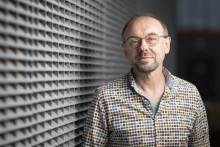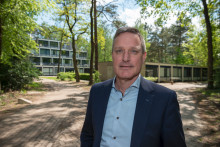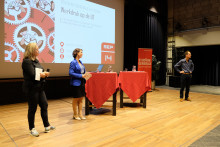HR Director Hans Oeloff and researcher Jan de Leede, who has written a report outlining how capacity management is currently handled at the UT, explain the plan for introducing a new capacity management infrastructure.
Why is the University of Twente developing guidelines for capacity planning?
De Leede: ‘The UT survey on well-being from 2019 showed that employees are highly committed to their work, but that they also experience high workload. This is not unique to the UT, the situation is similar at other universities and among academic staff in general. If we know about this issue, we should do something about it and take appropriate measures. I was therefore asked by the HR to do an inventory of how we deal with capacity management at the moment, and start answering the question: how do we distribute workload in a fair way? I talked to all faculties and departments and saw that each deals with capacity management in a different way, but it certainly has a potential to grow here.’
What does capacity planning look like in practice? Should we imagine software for logging in our work hours?
Oeloff: ‘We first need to create a vision, a model for the whole UT. We first need to develop a shared language and define what good workload actually is. Software or tools are maybe the last step.’
De Leede: ‘When you say ‘capacity management’ people automatically imagine a tool for calculating their hours, but that is not the case. We are not trying to develop a tool to control people. We want to make workload transparent and fair. It’s about creating a shared understanding, not giving managers a tool to control employees. It’s about stimulating dialogue on workload on team level.’
Who will be in charge of developing capacity management at the UT?
De Leede: ‘We are in the process of forming a working group with members from HR, FIN and all faculties. Among other things, they will visit other universities to learn from their practices. They will be in charge of developing the roadmap for improving capacity management at the UT. The first proposal should be ready in 2022.’
Will the roadmap apply to both academic and support staff?
Oeloff: ‘Yes, everyone. There will be a general model for the entire university, but each faculty and department should be able to adapt it, to choose their own process. The university is a complex organisation and we need to take the nature of every department into account. It will not be one size fits all. Our main goal is to improve wellbeing of all staff by distributing workload and making good use of available resources. We need to make workload visible.’
The vision still needs to be written, but what should be its main principles?
De Leede: ‘For us, capacity management should be a team effort. Alone you don’t have many possibilities to adapt your workload, and so it should not be a responsibility of every individual. It should be approached on a team level. Secondly, capacity management should be based on the ‘recognition and rewarding’ movement, highlighting that not every employee can be measured on exactly the same standards. Thirdly, the link with the UT’s goal and strategy must be clear.’
Oeloff: ‘Our ultimate goal is to improve people’s wellbeing.’







